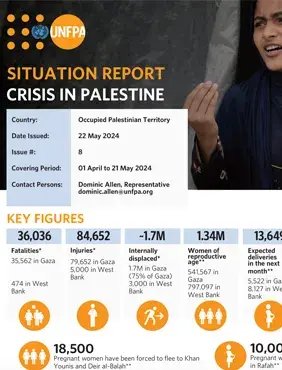The devastating crisis in Gaza intensified even further as a terrifying Israeli ground military operation in Rafah started on May 6, which has to date led to the displacement of 900,000 people from Rafah. Families and communities are being shattered again, having to move for a sixth or seventh time as they live atop rubble and sand, plagued by hunger and pain. These families are crammed into increasingly smaller and overcrowded areas where infrastructure is dwindling and basic necessities are scarce. Everything, from shelter to food, sanitation, and clean water, is in short supply and unaffordable, intensifying their unprecedented suffering.
Pregnant and breastfeeding women have been living in an unrelenting nightmare. Exhausted, traumatized, dehydrated, and malnourished, many face the looming threat of famine and lack even the basics for survival. Around 18,500 pregnant women have fled Rafah to areas like Al-Mawasi and Deir al-Balah. Maternal Healthcare access is minimal for these women.
Women and girls in Gaza are increasingly vulnerable to protection risks including sexual and gender based violence. Services and support structures have collapsed, they are separated from their communities and families, and are forced to seek refuge in overcrowded shelters and informal settlements.
Humanitarian efforts face significant challenges due to profound insecurity compounded by the continuous closure of crossings, leading to critical shortages of aid and basic services for the desperate and terrified population. Aid workers including UNFPA staff are mentally and emotionally exhausted, hindered by safety fears, logistical hurdles, limited resources, and social disorder. There’s almost nothing left to distribute in Gaza, and what does arrive is nowhere near enough, forcing difficult choices and partial rations that try to prioritize the most vulnerable.
In the West Bank, the situation is escalating rapidly with a lethal open-fire policy, daily search and arrests in towns and villages, and an alarming spike in violence by Israeli settlers against Palestinians across all cities. Movement restrictions continue to impede access to health and social services, the movement of ambulances, and the delivery of humanitarian assistance.
UNFPA played a pivotal role in providing essential reproductive health (RH) and gender-based violence (GBV) prevention and response services across the Gaza Strip. This included distributing reproductive health kits, facilitating over 50,000 SRH services, and establishing a mobile maternal health unit for emergency obstetric care. Additionally, UNFPA supplied menstrual hygiene products to thousands of women and girls, deployed SRH teams to non-formal shelters, and conducted SRH training for midwives in emergencies. GBV prevention efforts directly reached 25,000 individuals, while psychosocial support sessions benefited 10,000 women, adolescents, and children. UNFPA also conducted awareness sessions on sexual exploitation and abuse and offered remote counseling services through the Shubbak il Shabab helpline, providing assistance to over a thousand individuals.


